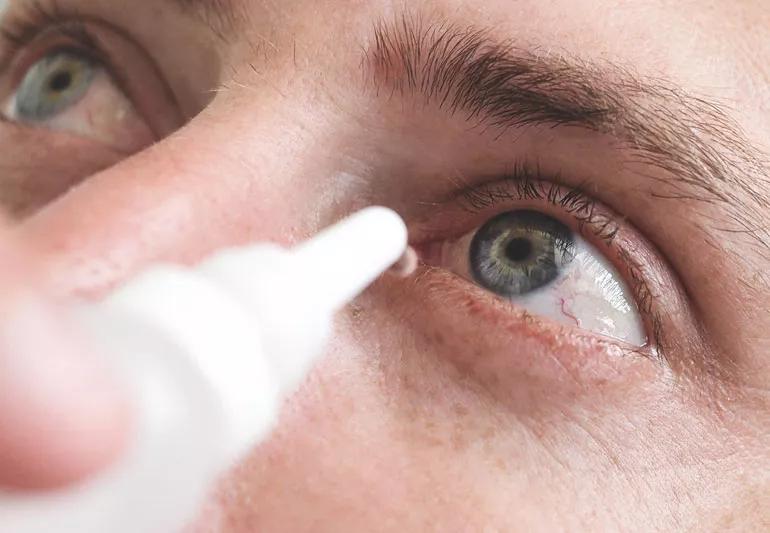Act quickly when a chemical or object gets in your eye

Image content: This image is available to view online.
View image online (https://assets.clevelandclinic.org/transform/d378543c-214a-4016-bd71-f15f7c6128a9/washEyeDrops-1308558815-770x533-1_jpg)
woman washing out eye with drops
Something just went in one (or both) of your eyes. Maybe it’s a splash of cleaner from a scrub bucket. It could be bits of debris from a project you’re doing. Or perhaps it’s just a pesky bug that took a wrong turn.
Advertisement
Cleveland Clinic is a non-profit academic medical center. Advertising on our site helps support our mission. We do not endorse non-Cleveland Clinic products or services. Policy
Whatever the liquid or object might be, your eye certainly feels the sting. So, what’s your next move?
Well, let’s start with what NOT to do: “Don’t rub at your eyes,” says ophthalmologist Nicole Bajic, MD. “It’s often your first instinct, but don’t do it. It’s not going to solve the problem and it could make things worse — especially if there is still a foreign body in your eye.”
So, keep those hands away from your face and follow these step-by-step instructions to flush out your eye (or eyes) and see the best possible results.
The initial action you should take if something gets in your eyes will vary depending on what the “something” is. (There’s a bit of a difference if you’re dealing with a liquid chemical vs. a wayward eyelash, for instance.)
But there’s one constant: Don’t wait.
“By and large, people do fine as long as you move to flush the eye right away,” says Dr. Bajic.
So, let’s look at a few situations.
If you don’t have a container label with safety instructions, flush your eyes (more on that in a minute) to dilute the chemical. Plan to follow up with a medical professional.
Advertisement
If the object is on your cornea, don’t start swiping at it. “Trying to poke it out could cause trauma,” warns Dr. Bajic. Instead, look to flush your eye.
Immediately irrigating your eyes can rinse away any chemical or debris that plopped onto your peepers. It’s a simple process, but there are some basic guidelines to make the flush more effective.
Hopping in the shower can be ideal if you’re at home and need to flush out your eyes. Let the warm water hit your forehead and flow down into your peepers. (Important tip: Don’t look straight into the pressurized shower stream. The goal is not to power wash your eyeballs.)
There are two basic ways to flush your eyes at a sink.
If you have a container of saline, eye wash or a gentle multi-purpose contact lens solution handy, feel free to use it, advises Dr. Bajic. Just avoid “super cleaning” solutions or solutions with hydrogen peroxide.
“With tearing, the eye is naturally designed to get particles out by bringing them toward that inner corner,” explains Dr. Bajic. “If you get more fluid in there, you should be able to help coax out whatever is in your eye.”
It was mentioned at the beginning of this article, and it bears repeating: DO NOT rub your eyes if something gets in them. “If something is lodged in your upper eyelid, rubbing it increases your risk of scratching your cornea and doing some real damage,” says Dr. Bajic.
Advertisement
Also, avoid using random medicated eye drops that may be in your house. Putting in the wrong medication can lead to problems if there’s an eye abrasion.
Plan on seeing an eye doctor immediately if a thorough flushing doesn’t remove whatever’s in your eye. This is particularly true if an object — such as a glass or metal shard or splinter of wood — penetrates your eye.
“We’ve got special tools and tricks to take things out,” says Dr. Bajic.
An appointment is also recommended if some sort of chemical liquid got in your eye to check for any damage. (If possible, bring the container or even cell phone photos of the container so your healthcare provider can better understand what got in your eye.)
Make sure to see your eye doctor if you experience vision problems or pain in your eye after an incident, too. (Learn more about first-aid tips for other eye injuries.)
Advertisement

Delivered every Tuesday!
Sign up for our Health Essentials emails for expert guidance on nutrition, fitness, sleep, skin care and more
Learn more about our editorial process.
Advertisement
Nocturnal lagophthalmos may be caused by damaged nerves or muscles in your face
The answer depends on your condition
Plus how pools, lakes and sprinklers affect your eyes
Find out what to treat yourself and when to get help
Be sure to protect your eyes from UV light and hazardous materials
Types of eye doctors and what they do
The Short Answer from an optometrist
It’s critical to have the proper eyewear if you plan to look up at the sun, especially during the total solar eclipse on April 8, 2024
Type 2 diabetes isn’t inevitable with these dietary changes
Applying a hot or cold compress can help with pain
Pump up your iron intake with foods like tuna, tofu and turkey